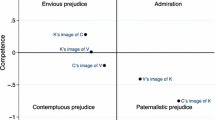Abstract
In four experiments, 120 subjects had to judge and reward the performance of players in a game. When no player fulfilled the norm of the game, subjects gave rewards arbitrarily or favored their friends among the players; when some players fulfilled the norm of the game, subjects made fair judgments, rewarding the players who fulfilled the norm, and they did not favor their friends. These findings suggest that research on in-group favoritism should include a serious discussion of the formal norms that regulate people's decisions when they have to allocate rewards.
Similar content being viewed by others
REFERENCES
Allport, F. H. (1934). The J-curve hypothesis of conforming behavior. J. Soc. Psychol. 5: 141-183.
Bettencourt, B. A., Brewer, M. B., Croak, M. R., and Miller, N. (1992). Cooperation and the reduction of intergroup bias: The role of reward structure and social orientation. J. Exp. Soc. Psychol. 28: 301-319.
Boldry, J. G., and Kashy, D. A. (1999). Intergroup perception in naturally occurring groups of differential status: A social relations perspective. J. Pers. Soc. Psychol. 77: 1200-1212.
Brewer, M. B., and Brown, R. J. (1998). Intergroup relations. In: Gilbert, D. T., Fiske, S. T., and Lindzey, G. (eds.), The Handbook of Social Psychology, 4th ed., McGraw-Hill, Boston, Vol. II, pp. 554-594.
Cialdini, R. B., Kallgren, C. A., and Reno, R. R. (1991). A focus theory of normative conduct: A theoretical refinement and reevaluation of the role of norms in human behavior. Adv. Exp. Soc. Psychol. 24: 201-234.
Durkheim, E. (1897). Le Suicide, Alkan, Paris.
Ellemers, N., and Van-Rijswijk, W. (1997). Identity needs versus social opportunities: The use of group-level and individual-level identity management strategies. Soc. Psychol. Q. 60: 52-65.
Fernández-Dols, J. M. (1992). Procesos escabrosos en Psicología Social: el concepto de norma perversa [Thorny processes in Social Psychology: The concept of perverse norm]. Revista de Psicología Social 7: 243-255.
Fernández-Dols, J. M. (1993). Norma perversa: Hipótesis te´oricas [Perverse norms: Theoretical hypotheses]. Psicothema 5(suplemento): 91-101.
Fernández-Dols, J. M., Amate, M., Caballero, A., Ruiz-Belda, M. A., Sell, L., and Oceja, L. V. (1994). Efectos culturales de las normas perversas [Cultural effects of perverse norms]. Revista de Psicología Social 9: 205-212.
Fernández-Dols, J. M., and Oceja, L. V. (1994). Efectos cotidianos de las normas perversas en la tolerancia a la corrupción [Everyday effects of perverse norms and acceptance of corruption]. Revista de Psicología Social 9: 3-12.
Hogg, M., and Abrams, D. (1990). Social motivation, self-esteem and social identity. In Abrams, D., and Hogg, M. (eds.), Social Identity Theory: Constructive and Critical Advances, Harvester Wheatsheaf, London, pp. 28-47.
Insko, C. A., and Schopler, J. (1987). Categorization, competition, and collectivity. In Hendrick, C. (ed.), Group Processes: Review of Personality and Social Psychology,Vol. 8, Sage, Newbury Park, pp. 213-251.
Lacalle, E., and Oceja, L. V. (1996). Efectos perversos de las normas incumplidas en la percepción de las autoridades [Perverse effects of unfulfilled norms in perception of authorities]. Revista de Psicología Social 11: 83-91.
Lerner, M. J. (1975). The justice motive in social behavior: Introduction. J. Soc. Issues 31: 1-19.
Lerner, M. J. (1981). The justice motive in human relations: Some thoughts of what we know and need to know about justice. In Lerner, M. J., and Lerner, S. C. (eds.), The Justice Motive in Social Behavior, Plenum Press, New York.
Markus, H. R., Kitayama, S., and Heiman, R. J. (1996). Culture and “basic ”psychological principles. In Higgins, E. T., and Kruglanski, A. W. (eds.), Social Psychology: Basic Principles, Guilford, New York, pp. 857-913.
Miller, D. T., and Prentice, D. A. (1996). The construction of social norms and standards. In Higgins, E. T., and Kruglanski, A. W. (eds.), Social Psychology: Basic Principles, Guilford, New York, pp. 799-829.
Oceja, L. V. (1997). Efectos perversos de las normas inclumplidas. Aspectos te´oricos y experimentales [Perverse effects of unfulfilled norms. Theoretical and experimental aspects]. Unpublished doctoral dissertation.
Oceja, L. V., and Fernández-Dols, J. M. (1992). El reconocimiento de la norma perversa y sus consecuencias en los juicios de las personas[The recognition of perverse norm and its consequences in people judgements]. Revista de Psicología Social 7: 227-240.
Otten, S., Mummendey, A., and Blanz, M. (1996). Intergroup discrimination in positive and negative outcome allocations: Impact of stimulus valence, relative group status, and relative group size. Pers. Soc. Psychol. Bull. 22: 568-581.
Rabbie, J. M., Schot, J. C., and Viser, L. (1989). Social identity theory: A conceptual and empirical critique from the perspective of a behavioral interaction model. Eur. J. Soc. Psychol. 19: 171-202.
Sachdev, I., and Bourhis, R. Y. (1991). Power and status differentials in minority and majority group relations. Eur. J. Soc. Psychol. 21: 1-24.
Shah, J. Y., Kruglanski, A. W., and Thompson, E. P. (1998). Membership has its (epistemic) rewards: Need for closure effects on in-group bias. J. Pers. Soc. Psychol. 75: 383-393.
Sherif, M. (1936). The Psycholgy of Social Norms, Harper and Row, New York.
Tajfel, H. (1978). Differentiation Between Social Groups: Studies in the Social Psychology of Intergroup Relations, Academic Press, London.
Turner, J. C. (1987). Rediscovering the Social Group: A Self Categorization Theory, Basil Blackwell, Oxford.
Webster's Third New International Dictionary (Vol. 2). (1986). Encyclopaedia Britannica, Chicago.
Author information
Authors and Affiliations
Corresponding author
Rights and permissions
About this article
Cite this article
Oceja, L.V., Fernández-Dols, J.M. Perverse Effects of Unfulfilled Norms: A Look at the Roots of Favoritism. Social Justice Research 14, 289–303 (2001). https://doi.org/10.1023/A:1014320024186
Issue Date:
DOI: https://doi.org/10.1023/A:1014320024186




